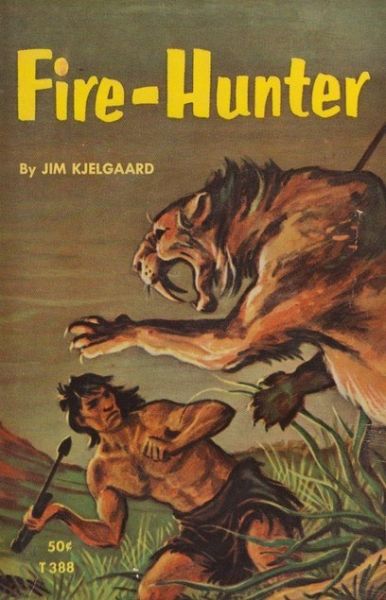The World is Our Own
Fire-Hunter
By Jim Kjelgaard

19 Jan, 2020
Because My Tears Are Delicious To You
0 comments
Jim Kjelgaard’s 1951 Fire-Hunter is a prehistoric adventure.
Hawk is his tribe’s master spear-maker. He doesn’t hunt; that’s dangerous and his skills are too valuable to lose. So sayeth the tribe. They’re a conservative bunch. They live on the edge of survival and cling to the old, tried-and-true methods.
Hawk, however, is an innovator. He sees an exciting new way to cast spears and cannot resist testing it. The new method works until it fails spectacularly, leaving a hunter dead on a woolly rhino’s horn.
The tribe expels Hawk and wanders off in their nomadic way.
Hawk is not alone. A young woman named Willow has also been left behind. She was wounded by wild dogs and though healed, cannot walk fast enough to keep up with the tribespeople. Will they be able to survive without the tribe? Hawk has never hunted; Willow is crippled (if only slightly). Their prospects look dim.
Hawk, however, is an innovator. With luck, insight, and trial and error, he reinvents hunting and fire-making. He also invents:
- the atlatl
- lighter throwing spears
- fletching to steady projectiles
- canine domestication
- the bow and arrow
- poisoned arrows
Willow isn’t quite Hawk’s equal as an inventor, but she does play a crucial role in domesticating their pet dog. She also invents the water-proof basket and takes care of Hawk in various ways (ways he barely notices, as it’s just what women do).
All this may come to nothing. A tribe of Neanderthals hunts Hawk and Willow. What hope do a lone caveman, his woman, their dog, and an arsenal of new weapons have against many enemies?
I think you can guess where this is going.
~oOo~
Hawk is aware that Willow is an attractive woman (forbidden to him by tribal taboo, at least at the beginning of the novel1) but he ignores most of her activities. Woman business, not his thing. Now, many novels written in the middle of the 20thcentury might have written Willow as useless, even an impediment. Fire-Hunter makes it clear that she contributes to their survival2. Even if Hawk doesn’t see it. Truly, society has made great strides since our earliest hunter-gatherer days.
Not only do Hawk and Willow manage to invent many useful things over a very short period, they do so over the course of a couple of hundred pages. Invention follows invention at a pace that would impress a Doc Smith engineer. Clearly Hawk had been prevented from reaching his full capability by the dullards he called fellow tribesmen.
The author’s note does acknowledge the unlikely pace:
The developments that occur in the time-span of this book undoubtedly took many generations. And yet who is to say?
David Drake wrote a revised and expanded version, 1991’s The Hunter Returns. I have not read it. I think I rediscover that the Drake exists every couple of years. Given Hawk’s progress in the first version, I can only assume that in the longer edition he invents firearms, the steam engine, and movable-type printing.
[Editor’s note: reminds me of Jean Auel’s Ayla, in the Earth’s Children series. Ayla invents the brassiere, the atlatl, animal domestication, the flint fire-starter, and the sewing needle. Among other things.]
Not only does this book chronicle a breakneck pace of invention, it is impressively violent. Animals are either prey or dangerous predators. Even prey can be dangerous, as the run-in with the rhino demonstrates. Hawk’s main interest in animals is how to kill and eat them, which he does with increasing ease. This seem an apt moment to point out this bit from the beginning of the book:
Wolf, the Chief Hunter, remembered and spoke of the time when such herds had been fairly common. Tribal legend recalled when the earth had trembled to the pounding hooves of countless giant bison, but that was no more. Hawk had never wondered why.
Hawk isn’t just ensuring survival for himself and Willow. He’s probably ushering in a new age of megafaunal extinction….
Fire-Hunter is available here (Amazon US), here (Amazon Canada), and here (Chapters-Indigo). If it is available from either Amazon UK or the Book Depository, I couldn’t find it.
1: Their shared language appears to consist of simple declarative statements; no long conversations around the fire for the couple.
2: Hawk, for example, rescues two dog puppies whose parents he kills. He’s planning on eating the puppies later. Willow grows attached to the puppies and won’t let them be killed. This gives one puppy the chance to die heroically protecting the humans and the other a chance to grow into a loyal companion.
There is, however, just the one domesticated dog. One wonders how the breed increased.
